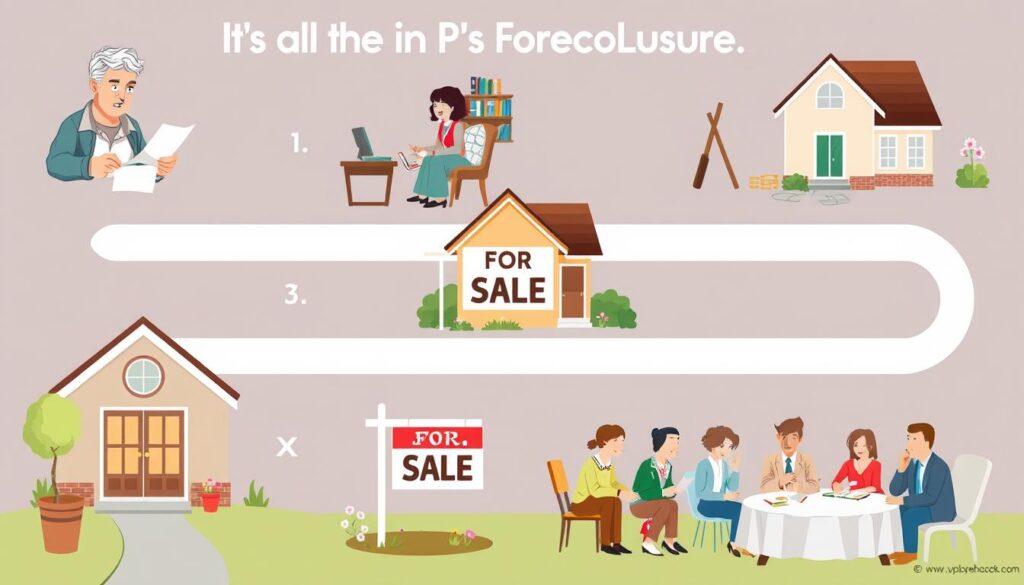Have you ever thought about taking back control of your finances when facing foreclosure? Many homeowners find themselves in a tough spot when they miss mortgage payments and enter pre-foreclosure. This guide will help you understand selling your house in pre-foreclosure and if it’s possible.
Knowing your rights and options is key, especially in places like New York where foreclosure can take years. Whether you’re thinking about a short sale or a traditional sale, acting fast is crucial. It can help you avoid a bank-forced sale.
Key Takeaways
- Pre-foreclosure gives homeowners a chance to sell before foreclosure starts.
- Acting quickly is important; foreclosure can take months to years. Early action offers better options.
- Working with a skilled real estate agent can make selling easier and ensure you follow state laws.
- Homeowners can sell their property through traditional or short sale during pre-foreclosure.
- Finding a fair price is key, especially in a competitive market, to attract buyers fast.
- Talking clearly with your lender is vital when selling your home in pre-foreclosure.
- Knowing the legal rules is important to avoid problems during the sale.
Understanding Pre-Foreclosure
Pre-foreclosure is a key time for homeowners who have missed mortgage payments. It’s important for homeowners, investors, and real estate professionals to understand this phase. This stage offers a chance to act before the lender starts foreclosure proceedings.
The Definition of Pre-Foreclosure
Understanding pre foreclosure means knowing it happens after missing mortgage payments. Usually, this is after three missed payments, when the lender sends a notice of default. Even though the lender is taking steps, the homeowner still owns the property. This gives them a chance to sell property in pre foreclosure before things get worse.
This period can last from weeks to over a year, depending on the state’s laws and court actions.
How Pre-Foreclosure Works in the Real Estate Market
Homeowners often try to avoid foreclosure by acting quickly during the pre foreclosure real estate sale. Laws about pre-foreclosure vary by state, affecting how long this stage lasts. In Florida, for example, homeowners have about 90 days to work with lenders or find other solutions.
They might try loan modifications, refinancing, or selling the property. Knowing how pre foreclosure works helps those facing financial trouble make better choices.
Can You Sell A House in Pre-Foreclosure?
Homeowners facing pre-foreclosure often wonder about their rights and options. Understanding these can help them sell their property and avoid bad credit scores. Selling early can help regain financial stability.
Your Rights as a Homeowner
Homeowners can sell their homes until the foreclosure auction. This right helps avoid the harm of foreclosure on credit scores. Talking to lenders can lead to better sale terms.
It’s possible to sell for a price that covers debts and keeps some equity. A good real estate agent can help with this process.
When to Sell: Timing is Crucial
Timing is key in pre-foreclosure. Homeowners should sell as soon as they get a notice of default. Waiting too long can lead to higher fees and less profit.
After a notice, homeowners have 60 to 90 days before a sale. Quick action can reduce losses and lead to a successful sale. They can prepare their home and attract buyers.

| Timeframe | Action |
|---|---|
| 0-3 months | Pay mortgage or communicate with the lender |
| 3-6 months | Receive a Demand or Notice to Accelerate letter |
| By 6 months | Consider selling home during pre-foreclosure |
| 6-9 months | Potential foreclosure auction if no actions are taken |
By planning well and acting fast, homeowners can get better sale terms. This can turn a tough situation into a better one.
Steps to Selling a House in Pre-Foreclosure
Homeowners facing pre-foreclosure often feel overwhelmed. But, by following specific steps, selling a house in pre foreclosure can be easier. Knowing how to gather documents and price your home right is key to a successful sale.
Gather Necessary Documentation
Before selling, it’s crucial to gather necessary documentation. You’ll need mortgage statements, the property deed, and any liens. Having these documents ready helps in talks with buyers and marketing efforts.
It makes the selling process faster and smoother.
Pricing Your Home for a Quick Sale
Setting the right price is vital for a quick sale. Researching the market and comparing your home to others in the area is important. Working with a real estate agent who knows the pre-foreclosure market can also help.
This partnership can guide you in making the best pricing decisions. It increases your chances of selling quickly.

Working with Real Estate Agents
Choosing the right real estate agent is key when selling a house before foreclosure. The process can be tough. Working with an agent who knows pre-foreclosure sales well can make a big difference. It’s important to find the right agent to make smart choices during tough times.
Finding the Right Agent for Pre-Foreclosure Sales
When working with real estate agents, look for those with pre-foreclosure experience. Here are important things to consider:
- Experience with short sales and distressed property transactions.
- Knowledge of local market conditions affecting pre-foreclosure sales.
- Positive past client testimonials showcasing successful transactions.
- A proactive approach in communicating with both sellers and potential buyers.
By focusing on these points, sellers can improve their chances of a good sale. This can help reduce the stress of selling a house pre foreclosure.
The Importance of Experience in Foreclosure Situations
The importance of experience in foreclosure situations is huge. Agents with foreclosure knowledge can offer big help. Here are key benefits of working with experienced agents:
- Ability to negotiate intricately with lenders on behalf of the homeowner.
- Expertise in streamlining the sale process, which is essential given the limited timeframe associated with pre-foreclosure.
- Awareness of legal requirements and best practices to help avoid pitfalls during the sale.
In many cases, an experienced agent can help avoid foreclosure and protect the homeowner’s credit score. Dealing with these challenges needs a professional’s help. Choosing the right agent is an investment in a safer financial future.
Options for Selling: Short Sale vs. Traditional Sale
Homeowners facing financial trouble often look at different ways to sell their homes. It’s important to know the differences between a short sale and a traditional sale. Each choice has its own benefits and challenges, affecting the homeowner’s financial future.
What is a Short Sale?
A short sale happens when a homeowner sells their home for less than the mortgage debt. This usually happens when the homeowner can’t make mortgage payments. Short sale basics include getting the lender’s okay, as they must agree to the sale. The process can take three to six months or more, needing lots of paperwork.
This way, the homeowner can avoid foreclosure and stay in the home while selling. But, a short sale doesn’t always wipe out all mortgage debt. Lenders might still go after the homeowner for the difference. Still, a short sale is better for credit scores than foreclosure.
Understanding Traditional Sale in a Pre-Foreclosure Context
On the other hand, a traditional sale in pre-foreclosure means selling for enough to cover the mortgage debt. Homeowners don’t need lender approval for this, making it simpler. They must find offers that meet their mortgage and possibly keep some equity.
| Feature | Short Sale | Traditional Sale |
|---|---|---|
| Approval Requirement | Lender approval needed | No lender approval needed |
| Time to Process | 3-6 months (or longer) | Typically quicker |
| Effect on Credit Score | Negative, but less severe | Minimal (if debt is covered) |
| Possibility of Debt After Sale | Potential for deficiency balance | No remaining mortgage debt |
| Homeowner’s Occupancy | Usually allowed to stay during the sale | Selling typically involves vacating the home |
Homeowners have options when facing financial trouble. Each choice has its own pros and cons. It’s important to think about the situation and long-term goals carefully.
Legal Considerations When Selling a Home in Pre-Foreclosure
When selling a home in pre-foreclosure, you need to pay close attention to the law. Knowing the legal steps can help you sell successfully. It’s important to be well-informed and ready for what comes next.
Consulting with Legal Experts
Getting advice from legal experts is key when selling a home in pre-foreclosure. Real estate lawyers can guide you on your rights and what the law requires. They help you prepare for talks with lenders and buyers, making sure you’re informed.
Working with professionals helps set clear goals and avoid problems. This is especially true in urgent situations like pre-foreclosure.
Notification Requirements for Lenders
Knowing what lenders need to know is vital when selling in pre-foreclosure. Even if you don’t need permission for a sale, telling lenders is often required. This is especially true for short sales.
Notifying lenders properly can prevent misunderstandings. Legal experts can help you follow these rules. This ensures a smooth sale and protects your interests.
Conclusion
Selling a house before foreclosure is a smart move for homeowners. It helps avoid the bad effects of foreclosure. Knowing how pre-foreclosure works can make this process easier.
In Florida, foreclosure can take 8 to 14 months. Pre-foreclosure starts 30 days after missing a mortgage payment. So, acting fast is crucial to keep your finances stable.
When selling a house in pre-foreclosure, it’s important to know your rights. You also need to understand pricing, paperwork, and your selling options. This includes short sales or traditional sales.
Being open about your property’s condition can attract buyers. This is true even when foreclosure is a possibility.
Getting ready, seeking professional advice, and acting quickly can lead to good results. It can reduce stress and help keep your credit score intact. Selling before foreclosure can be a smart choice to avoid worse financial problems.






